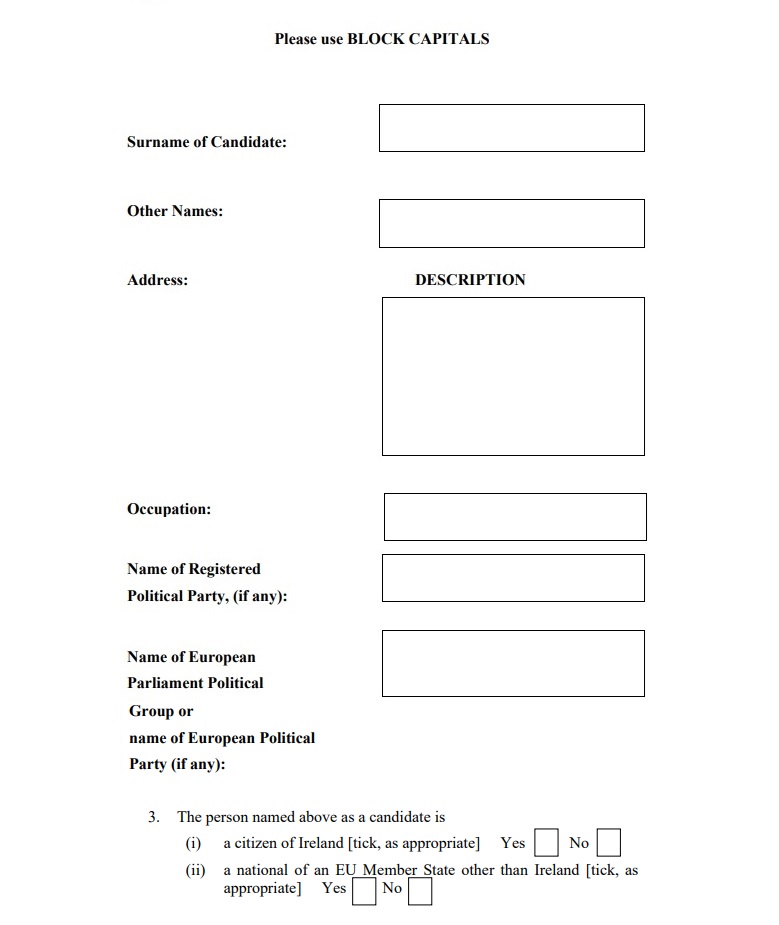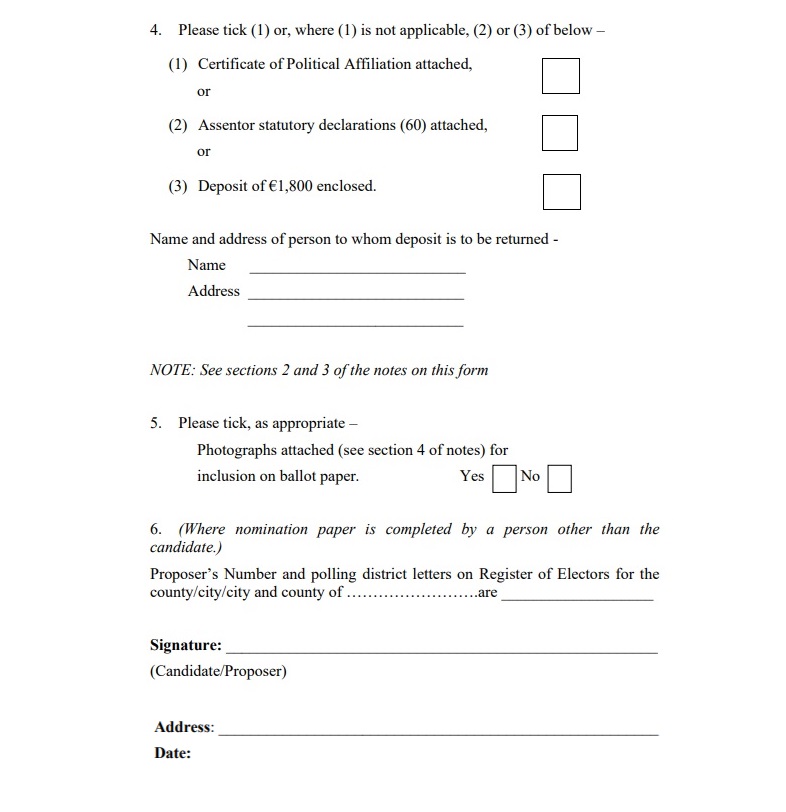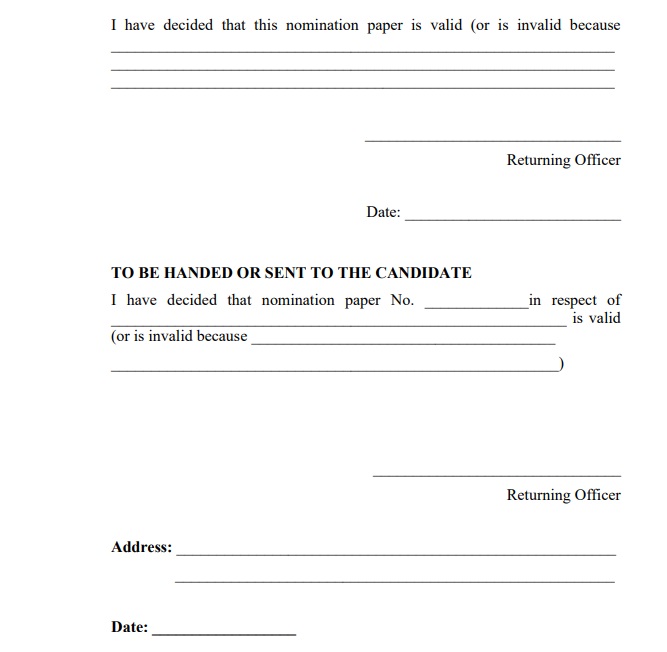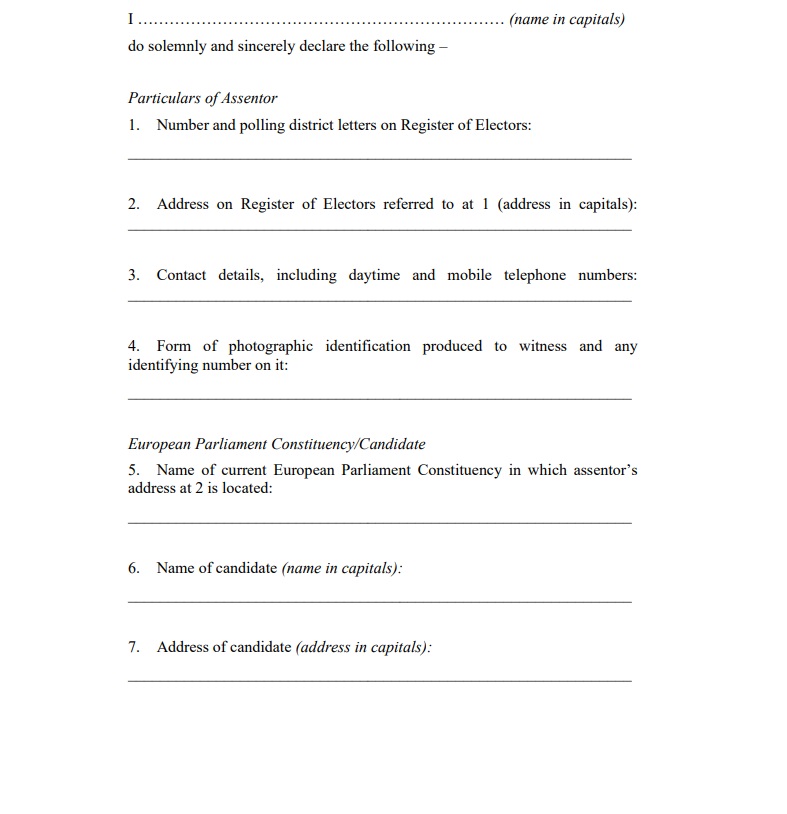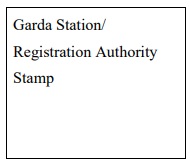S.I. No. 98/2024 - European Parliament Elections (Amendment) Regulations 2024
Notice of the making of this Statutory Instrument was published in | ||
“Iris Oifigiúil” of 22nd March, 2024. | ||
I, MALCOLM NOONAN, Minister of State at the Department of Housing, Local Government and Heritage, in exercise of the powers conferred on me by section 3 of the European Parliament Elections Act 1997 (No. 2 of 1997) and the Housing, Local Government and Heritage (Delegation of Ministerial Functions) Order 2023 ( S.I. No. 615 of 2023 ) hereby make the following Regulations – | ||
1. These regulations may be cited as the European Parliament Elections (Amendment) Regulations 2024. | ||
2. The European Parliament Elections Regulations 2019 ( S.I. No. 65 of 2019 ) are amended by substituting forms EP2 and EP2A in the Schedule hereto for forms EP2 and EP2A in the Schedule to the said Regulations. | ||
3. These Regulations and the European Parliament Elections Regulations 2019 ( S.I. No. 65 of 2019 ) may be cited together as the European Parliament Elections Regulations 2019 to 2024 and should be construed as such. | ||
Schedule | ||
FORM EP2 | ||
(Rule 5(1) of the Second Schedule to the | ||
European Parliament Elections Act 1997) | ||
NOMINATION PAPER FOR EUROPEAN PARLIAMENT ELECTIONS | ||
(____________/_____) | ||
(month/year) | ||
No. _____________________ | ||
(To be inserted by returning officer) | ||
PLEASE READ NOTES BEFORE COMPLETING FORM AND USE BLOCK CAPITALS | ||
1. I nominate the person named under as a candidate for election to the European Parliament for the constituency of ___________________________ | ||
2. I declare that I have read the notes on this nomination paper and that – | ||
(a) the person named as a candidate | ||
(i) has consented to the nomination; | ||
(ii) is not a candidate at the election in any other constituency; | ||
(iii) is not a candidate at the election in any other EU Member State; and | ||
(b) to the best of my knowledge and belief, the person named as a candidate is eligible for election to the European Parliament and the information furnished in the nomination paper is correct in all material respects. | ||
Please use BLOCK CAPITALS | ||
| ||
NOTE: If the candidate is a national of a Member State other than Ireland the nomination paper must be accompanied by a statutory declaration (Form EP3)- see section 7 of the notes on this form. (This is a mandatory requirement and should not be confused with the option at 4(2) below) | ||
| ||
7. Decision of Returning Officer | ||
| ||
Notes: The notes attached are for guidance only and do not purport to be a legal interpretation. | ||
Notes on FORM EP2 - Nomination Paper for European Parliament Elections | ||
(References in parentheses are to the provisions of the European Parliament Elections Act 1997 , as amended - see section 11 of the notes on this form). | ||
1. Nomination | ||
A candidate may be nominated for one constituency only and in only one Member State of the European Union (section 12). | ||
A candidate may nominate himself or herself or may, with the candidate’s consent, be nominated by a proposer. A proposer must be registered as a European elector in the constituency for which he or she proposes to nominate the candidate (section 12). | ||
2. Candidate Nomination Procedures | ||
A nomination paper from a candidate of a registered political party must have a certificate of political affiliation attached (see 3 below). | ||
If no certificate is attached, one or other of the following procedures must be complied with before the expiration of the time for receiving nominations - | ||
(i) the completion of statutory declarations by 60 assentors registered as European electors in the relevant constituency which must be witnessed by a Commissioner for Oaths, a Peace Commissioner, a Notary Public, a member of the Garda Síochána or an official of the registration authority, | ||
or | ||
(ii) the candidate, or someone on his or her behalf, lodging a deposit of €1,800 with the returning officer. | ||
Under the assentors option, the relevant form for the making of a statutory declaration (Form EP2A) is available from returning officers and registration authorities. The relevant details of the assentors must be included on the statutory declarations - number (and polling district letters) on the register of European electors, address on the register, contact details, the relevant European Parliamentary constituency on the date of assent where he/she is registered, the name and address of the candidate, and the form of prescribed photographic ID produced and any identifying number on it. | ||
Each assentor MUST when making the statutory declaration bring one of the following photographic documents for identification purposes – passport, driving licence, employee identity card containing a photograph, student identity card issued by an educational institution and containing a photograph, travel document containing name and photograph or a Public Services Card. One of the documents MUST be produced to the person taking the statutory declaration. | ||
An assent is valid only in respect of the European Parliament constituency in which the assentor’s address at the time of assent is located at election time. The assent may be made at any time but it may only be used at the next European election in the relevant constituency. | ||
Responsibility lies with the candidate or proposer to secure the necessary assents, to attach the 60 statutory declarations to the nomination paper and to deliver all the documentation to the returning officer by the deadline for receipt of nominations. | ||
An assentor must confirm on the statutory declaration that he or she has not assented to the nomination of any other candidate in the election concerned. Under the Statutory Declarations Act 1938 , a person who knowingly makes a false or misleading statutory declaration in any material respect is liable on conviction to a class B fine or imprisonment for a term not exceeding 6 months or both. However, a candidate’s nomination will not be invalid where a person assents to the nomination of more than one candidate. | ||
Under the deposits option, a candidate may choose the alternative of making a deposit and, if he or she does not do so and has not opted to secure 60 assents, their candidature will be deemed to have been withdrawn. A candidate, or someone on his or her behalf, may lodge a deposit of €1,800 with the returning officer before the expiration of the time for receiving nominations. The deposit may be made by means of legal tender or, with the consent of the returning officer, in any other manner. The deposit will be returned in the case of successful candidates, those receiving votes in excess of a quarter of the quota and in certain other circumstances: death, not being validly nominated, withdrawal of candidature or where candidature is deemed to be withdrawn. Otherwise, the deposit will be forfeited. (Where the deposit is to be returned, it will be returned to the person making it and the name and address of that person should be entered at 4(3) on the nomination paper). | ||
All relevant parts of the nomination paper must be completed by all candidates (sections 11, 12, 13 and 13A). | ||
3. Certificates of Political Affiliation and of European Political Affiliation | ||
(a) A party candidate may include in the nomination paper the name of his/her registered political party, together with the name of any European Parliament political group, or European political party noted on the Register of Political Parties in relation to that political party1 , provided a completed Certificate of Political Affiliation is produced to the returning officer with the nomination paper. The name of the party, or of the party and the European Parliament political group or the European political party, should be entered in the appropriate part of section 2 of this form. | ||
(b) A non-party candidate may enter the words “Non Party” in the part of section 2 of this form relating to a registered political party or may leave the space blank. A non-party candidate who is a sitting MEP may include on the nomination paper the name of the European Parliament political group of which he/she is a member, provided a completed Certificate of European Political Affiliation is produced to the returning officer with the nomination paper. This is a certificate signed by a member of the Secretariat of the relevant political group that the candidate is a member of the political group named in the certificate and formed in accordance with the rules and procedure of the European Parliament. (rule 5 of the Second Schedule). | ||
4. Candidate’s Photograph | ||
If a candidate wishes to have his or her photograph included on the ballot paper, they must provide with the nomination paper - | ||
• A photograph in digitised format (passport size – 35mm x 45mm); AND | ||
• Two identical printed copies of the photograph. | ||
The photograph must be taken not more than 12 months prior to polling day and must be of good quality, in colour and taken to a professional standard, showing the candidate’s full face, head and shoulders only, on a light background (any colour). | ||
Each printed copy of the photograph must have the candidate’s name clearly shown on the back. | ||
If the above requirements are not complied with, the returning officer may not include the photograph on the ballot paper. In these circumstances, or if no photograph is supplied, the space for the candidate’s photograph will be left blank on the ballot paper. | ||
THE ONUS IS ON THE CANDIDATE TO MEET THESE REQUIREMENTS. | ||
5. Delivery of Nomination Paper | ||
The completed nomination paper must be delivered to the returning officer in person by the candidate or proposer within the period fixed for the receipt of nominations (ending at 12 noon on the last day for receiving nominations) – i.e. by the seventh day (disregarding any excluded day) after the latest date for the publication of the notice of election in the case of a candidate who is a national of a Member State other than the State and by the fourteenth day (disregarding any excluded day) after the latest date for the publication of the notice of election in the case of a candidate who is a citizen of Ireland (rules 10 and 11 of the Second Schedule). | ||
6. Ruling on Nomination Paper | ||
The returning officer will rule on the validity of the nomination paper within one hour of its delivery to him/her and may rule that it is invalid if he/she considers that it is not properly made out or signed. A returning officer may also rule as invalid a nomination paper from a candidate without a certificate of political affiliation who has opted for the assenting alternative referred to at 2 above if he or she considers that the candidate has not complied with the statutory requirements relating to assenting. | ||
The returning officer is required to object to the candidate’s name if it: | ||
(a) is not the name by which the candidate is commonly known, or | ||
(b) is misleading and likely to cause confusion, or | ||
(c) is unduly long, or | ||
(d) contains a political reference. | ||
The returning officer is also required to object to a candidate’s description if it is, in his or her opinion, incorrect, insufficient to identify the candidate or unnecessarily long or which contains a political reference other than, where appropriate, a reference to a public or elected office held, or formerly held, by the candidate or an entry in the nomination paper referred to at 3(a) or (b) above. | ||
The ruling on the nomination paper may be attended by the candidate and proposer (if any), one other person designated by the candidate (or his/her proposer) and any other person authorised by the returning officer (rule 13 of the Second Schedule). | ||
7. National of EU Member State other than Ireland | ||
In the case of a candidate who is a national of an EU Member State other than Ireland the returning officer is required to rule his/her nomination paper invalid if | ||
(a) it is not accompanied by: | ||
a statutory declaration made by the candidate on Form EP3 (which may be obtained from the returning officer) stating his or her nationality, the date and place of birth, the last address in his or her home Member State, the address in Ireland at which he or she is ordinarily resident, the locality/constituency where he or she was last registered as an elector in the home Member State, that he or she is not a candidate at the election in any other Member State, and that he or she does not stand deprived of the right to stand as a candidate under the law of their home Member State as a result of an individual judicial decision, or an administrative decision that may be subject to judicial remedies | ||
or | ||
(b) the statutory declaration is not properly made out and signed (rules 6 and 13 of the Second Schedule). | ||
8. Eligibility for election to the European Parliament | ||
Eligibility for election to the European Parliament is governed by section 11 of the European Parliament Elections Act 1997 (as amended). | ||
9. Withdrawal of nomination | ||
Any candidate may withdraw his/her nomination up to 12 noon on the day (disregarding any excluded day) after the latest date for receiving nominations from candidates who are Irish citizens. The notice of withdrawal to the returning officer must be signed by the candidate and delivered in person by the candidate or proposer. Where the returning officer is satisfied that a candidate wishes to withdraw and that neither the candidate nor the proposer can attend in person, the returning officer will accept a notice of withdrawal, signed by the candidate and by the person delivering it, which is received by the latest time for withdrawal (rule 15 of the Second Schedule). | ||
10. Penalties | ||
A person is liable to a fine or imprisonment or both under the European Parliament Elections Act 1997 for | ||
(a) producing to the returning officer a forged /forging a - | ||
(i) nomination paper, or | ||
(ii) certificate of either political affiliation or European political affiliation, | ||
(b) offering or accepting bribes or exercising undue influence in relation to a candidature or the withdrawal, or non-withdrawal, of a candidature (rules 104 and 105 of the Second Schedule), | ||
(c) without the consent of the person concerned – | ||
(i) nominating such person as a candidate, or | ||
(ii) withdrawing the candidature of such person (rule 110 of the Second Schedule) and, | ||
(d) making a false declaration that a candidate is eligible for election or has consented to nomination or does not stand validly nominated in any other constituency or is not a candidate at the election in any other EU Member State (rule 112 of the Second Schedule). | ||
Penalties under the Statutory Declarations Act 1938 in respect of knowingly making a false or misleading statutory declaration are set out at 2 above. | ||
11. Legislation | ||
The European Parliament Elections Act 1997 (as amended) governs the nomination of candidates at elections to the European Parliament. | ||
FORM EP2A | ||
(Section 12(3) of the European | ||
Parliament Elections Act 1997) | ||
FORM OF STATUTORY DECLARATION | ||
BY ASSENTORS TO NOMINATION OF CERTAIN CANDIDATES | ||
AT EUROPEAN PARLIAMENT ELECTIONS | ||
| ||
Assent | ||
8. I assent to the nomination of the candidate referred to at 6 and 7 at the next European Parliament election to be held in the European Parliament constituency in which the address at 2 is located at the time of the election. | ||
9. I have not assented to the nomination of any other candidate at the election referred to at 8 or at any other European Parliament election to be held at the same time as that election, | ||
and I make this solemn declaration conscientiously believing the same to be true and by virtue of the Statutory Declarations Act 1938 . | ||
Signed.................................................. | ||
Declared before me ..................................... [name in capitals] [a notary public] [a commissioner for oaths] [a peace commissioner] [a member of the Garda Síochána] [an official of the registration authority] | ||
by .................................................who is personally known to me | ||
at .......................................................................... | ||
[place of signature] this....... day of ........................[date]. | ||
.................................... | ||
[signature of witness] | ||
| ||
[where appropriate] | ||
Notes on FORM EP2A – Form of Statutory Declaration by Assentors to nomination of certain candidates at European Parliament Elections. | ||
(Please read the notes carefully before completing the statutory declaration. These notes are for guidance only and do not purport to be a legal interpretation). | ||
General | ||
Sections 12 and 13 of the European Parliament Elections Act 1997 , which were substituted by section 10 of the Electoral (Amendment) Act 2009 , provide that where a person is not a candidate of a registered political party, one or other of the following procedures must be complied with before the expiration of the time for receiving nominations in order for that person to be validly nominated to stand as a candidate at a European Parliament election: | ||
(i) the completion of statutory declarations by 60 assentors to the nomination who are registered as European electors in the relevant European Parliament constituency. The assents must be witnessed by a Notary Public, a Commissioner for Oaths, a Peace Commissioner, a member of the Garda Síochána or an official of the registration authority (County/City/City and County Council), or | ||
(ii) the candidate, or someone on his or her behalf, lodging a deposit of €1,800 with the returning officer. | ||
This form is to be used for making statutory declarations of assent under (i) above; copies of the form are available free of charge from returning officers and registration authorities. | ||
An assent is valid only in respect of the European Parliament constituency in which the assentor’s address at the time of assent is located at election time. | ||
An assent may be made at any time but it may only be used at the next European Parliament election in the relevant constituency. | ||
Responsibility lies with the candidate or his/her proposer at the election to secure the necessary assents, to attach the 60 statutory declarations to the nomination paper and to deliver all the documentation to the returning officer by the deadline for receipt of nominations at the election. Please note the different deadlines for receipt of nominations for candidates who are Irish citizens and candidates who are nationals of other EU Member States. | ||
A returning officer may rule as invalid a nomination paper from a candidate who has opted for the assenting alternative if he or she considers that the candidate has not complied with the statutory requirements relating to assenting. | ||
Notes to Parts of Form | ||
All parts of the form must be completed. | ||
Parts 1 and 2: The assentor should enter his/her number and polling district letters (Part 1) and address (Part 2) as stated on the Register of Electors. The Register may be inspected at the county/city and county council’s offices or on their website; at libraries, post offices and Garda Stations; and through www.checktheregister.ie. | ||
Part 3: Enter contact details, including daytime and mobile telephone numbers. | ||
Part 4: Each assentor must when making the statutory declaration bring one of the following photographic documents for identification purposes – passport, driving licence, employee identity card containing a photograph, student identity card issued by an educational institution and containing a photograph, travel document containing name and photograph or a Public Services Card. | ||
One of the documents must be produced to the witness taking the statutory declaration, and the type of document must be recorded in Part 4 along with any identifying number on it (e.g. passport number). | ||
Part 5: Enter the name of the European Parliament Constituency where the address at Part 2 of the form is located on the date of the making of the statutory declaration. It should be noted that an assent is valid only in respect of the European Parliament constituency in which the assentor’s address at the time of assent is located at election time. | ||
Parts 6 and 7: Enter the name (Part 6) and address (Part 7) of the candidate whose nomination is being assented to. | ||
Part 8: This is the formal assent to the nomination of the candidate at the next European Parliament election to be held in the constituency in which the address at Part 2 is located at election time. | ||
Part 9: The assentor has to confirm on the statutory declaration that he or she has not assented to the nomination of any other candidate in the election concerned or at any other European Parliament election to be held at the same time as that election. | ||
The assentor must sign the declaration in the presence of the witness. | ||
Witness to Statutory Declaration | ||
The statutory declaration must be witnessed by a Notary Public, a Commissioner for Oaths, a Peace Commissioner, a member of the Garda Síochána or an official of the registration authority. Where the necessary ID is produced under Part 4, the law provides that this is sufficient for the witness to sign on the form that the assentor is personally known to him/her. | ||
In the case of Gardaí or registration authority officials, the declaration must be stamped with the official stamp of the garda station or registration authority in the box provided. | ||
Penalties | ||
Under the Statutory Declarations Act 1938 , a person who knowingly makes a false or misleading statutory declaration in any material respect is liable on conviction to a class B fine or imprisonment for a term of up to 6 months or both. | ||
GIVEN under my hand, | ||
19 March 2024 | ||
MALCOLM NOONAN, | ||
Minister of State at the Department of Housing, Local Government and Heritage. | ||
EXPLANATORY NOTE | ||
(This note is not part of the Instrument and does not purport to be a legal interpretation.) | ||
These regulations amend S.I. No. 75 of 2019 and provide for an updated nomination form EP2 and assentors form EP2A at European elections. The updates reflect the introduction of a rolling register of electors. | ||
1 Established in accordance with Regulation (EU, Euratom) No. 1141/2014 |

